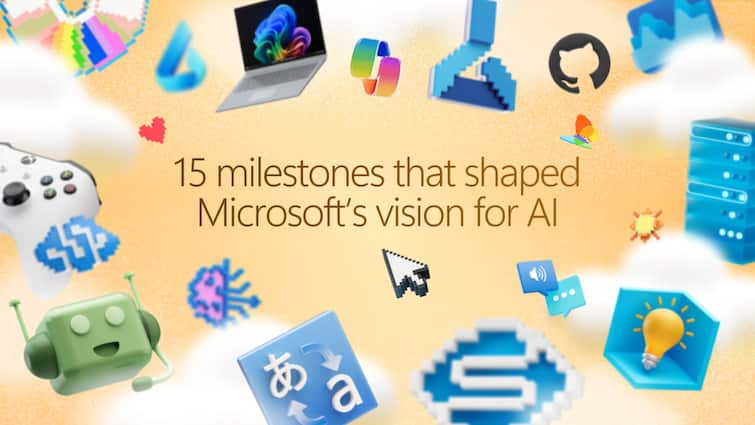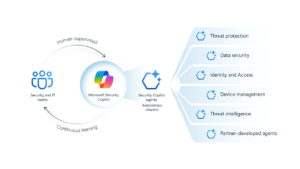15 Significant Milestones That Shaped the Future from Bing to Copilot

Microsoft is commemorating its 50th anniversary of technological innovation, and a significant aspect of its journey has been its impact on artificial intelligence (AI). The company has continually evolved its technology over the years, from the development of early operating systems to sophisticated AI tools. As AI becomes an integral part of our daily lives, Microsoft’s advancements have been pivotal in shaping the AI industry.
Major Milestones in Microsoft’s AI Journey
Microsoft’s journey in AI can be highlighted through several crucial milestones:
Bing: The Start of AI-Powered Search
Launched in 2009, Bing integrated natural language processing and machine learning to improve search results. Its features, including query suggestions and related searches, utilized semantic technology from Powerset, a company Microsoft acquired in 2008. These innovations laid a strong foundation for future AI-driven search experiences in Microsoft’s ecosystem.
Project Oxford: AI Development in Azure
In 2015, Microsoft launched Project Oxford, providing developers with tools for face detection, voice recognition, and language understanding. Now known as Azure AI Foundry, this project supports over 60,000 organizations, with 65% of Fortune 500 companies utilizing Azure OpenAI services.
Deep Learning Breakthrough with ResNet
Microsoft Research achieved a significant advancement in 2015 with the development of Deep Residual Networks (ResNet). This framework enhanced deep learning models and improved AI applications in fields like self-driving cars, medical imaging, and computer vision. “ResNet set the benchmark for computer vision,” stated Peter Lee, President of Microsoft Research.
Enhancing Accessibility with Seeing AI
In 2016, Microsoft made strides in inclusive technology with the introduction of Seeing AI. This application assists visually impaired users by describing their environment, reading text, and identifying facial expressions. Its features include “Find My Things,” which helps users locate frequently misplaced objects.
Brainwave: Boosting AI Processing
Microsoft unveiled Project Brainwave in 2017, an AI acceleration platform designed for deep learning tasks. By using field-programmable gate arrays (FPGAs), Brainwave improved real-time AI processing, making it especially effective for image recognition and language-related tasks.
Turing-NLG: Advancements in Language Models
In 2020, Microsoft introduced Turing-NLG, one of the largest language models at that time, consisting of 17 billion parameters. This model paved the way for future AI advancements, including models for visual recognition and enhancements in conversational AI tools.
AI in Healthcare: Nuance and Ambient Clinical Intelligence
With the acquisition of Nuance in 2020, Microsoft launched the Dragon Ambient eXperience (DAX) Copilot. This voice-activated AI tool simplifies clinical documentation, allowing healthcare providers to focus more on patient care while reducing their administrative workload.
Partnership with OpenAI: Advancing Supercomputing
In 2020, Microsoft also unveiled an Azure-hosted supercomputer to support OpenAI, ranking among the top five globally at the time. This infrastructure significantly accelerated the training of AI models and enhanced Microsoft’s collaboration with OpenAI, pushing forward AI research and practical applications.
GitHub Copilot: AI for Developers
After acquiring GitHub, Microsoft launched GitHub Copilot in 2021. This AI-powered coding assistant aids developers by providing real-time coding suggestions. It gained popularity, with over 77,000 organizations adopting it across various sectors.
AI-Powered Transformation of Bing and Edge
In 2023, Microsoft infused AI into both Bing and Edge browsers, transforming the overall search experience. This upgrade also propelled Copilot’s expansion across Microsoft applications, shifting the concept of AI from a tool for information retrieval to a comprehensive digital assistant.
Copilot+ PCs: The Next Generation of Computing
Building upon existing AI technology, Microsoft revealed Copilot+ PCs in 2024. These systems combine CPUs, GPUs, and Neural Processing Units (NPUs) to efficiently handle AI tasks, resulting in faster and more personalized computing experiences.
AutoGen: Simplifying AI Development
In 2023, Microsoft launched AutoGen, an open-source framework aimed at building AI agents. This tool facilitates cooperation among multiple AI agents, promoting innovation and simplifying the development of automation and problem-solving technologies.
Phi: Efficient Small Language Models
Continuing its AI journey in 2024, Microsoft introduced Phi, a small yet powerful language model designed for efficient and cost-effective AI applications, capable of functioning on mobile devices and edge computing environments.
Muse: Innovation in Gaming AI
In 2025, Microsoft launched Muse, an AI model engineered specifically for the gaming industry. This technology understands game mechanics and player interactions, enabling developers to quickly create and iterate immersive gaming experiences.




